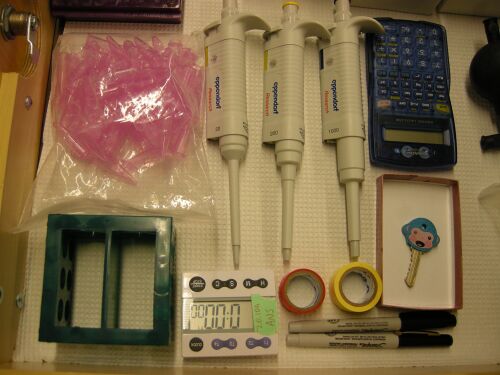20.109(S11): Assignments
Overview
You will perform three series of experiments (called “modules”) over the course of the semester. The modules differ in both intellectual and experimental content, and in the ways that your learning will be assessed. Links to the experiments and assignments are provided below.
You will be working as pairs throughout the semester in lab, but you must submit individual written work (for both daily homeworks and major assignments) and give individual journal club presentations. You will close out the course by developing and presenting a novel research idea as a two-person team. Please read the 20.109 statement on collaboration and integrity for more detail about academic honesty in our class. You are encouraged to ask one of the teaching faculty if any question arises about what constitutes collaboration, plagiarism, etc.
We appreciate that time management can be a difficult skill to develop, and that learning takes place on many time-scales. However, when assignments are turned in at wildly disparate times, it creates additional logistical burdens for the teaching faculty. Therefore, late work (both daily and culminating assignments) will be penalized 1/3 of a letter grade for each day late and will not be accepted after a week. We strongly recommend that you plan ahead and space out your work when possible.
We will endeavour to provide equal access to subject 20.109 for students with disabilities, in accordance with the Americans with Disabilities Act (ADA) of 1990. Please see the teaching faculty as soon as possible regarding accommodation you may need.
Major Assignments
| Module | Topic | Assignment | % of Final Grade | Links to Description and/or Evaluation |
| 1 | RNA Engineering | Laboratory report | 15 | Assignment description and evaluation rubric General scientific writing guidelines |
| Computational analysis | 5 | Assignment description Data file (PDF download) or (DOC download) | ||
| Journal club presentation | 10 | Sign-up for article General oral presentation guidelines Evaluation rubric (PDF download) | ||
| 2 | System Engineering | Research article | 25 | Assignment description and evaluation rubric General scientific writing guidelines |
| 3 | Cell-Biomaterial Engineering | Research idea presentation | 20 | Assignment description Evaluation rubric (PDF download) |
| Data summary | 5 | Assignment description and evaluation rubric |
Daily Work
In addition to the assignments listed above there will be
- Daily Lab Quizzes (5% of final grade)
- These are intended to refresh your memory about the experiment you are performing. They will not be hard and should take no more than 5-10 minutes at the beginning of lab.
- Laboratory Notebooks (5% of final grade)
- You will record your data on the white pages of a bound notebook. The yellow, duplicate pages will be collected and evaluated by the teaching assistants.
- Notebooks will be evaluated according to the criteria described here.
- Homework Assignments (7% of final grade)
- These will vary considerably in content and points associated with each assignment. You may be asked to perform a calculation, draw a conclusion, and/or make a figure using the data you have collected. The homeworks can be found in the "for next time" section of each lab day. You can work with your lab partner, friends and teaching assistants on these assignments but you will hand in individual assignments unless otherwise specified.
- Participation and Reflection (3% of final grade)
- As a student in 20.109, you are expected to be an active participant in a scientific community. Your student colleagues, the teaching faculty, and especially your lab partner, are all your collaborators. They rely on you for timely posting of your data, and for your unique and thoughtful contributions during class. Your participation grade will ultimately be reviewed by all the teaching faculty. As a starting point, you should write a brief (~ 250 ± 50 words) reflective piece on your 20.109 experience once per module. You might comment explicitly on your participation (such as asking/answering questions during lecture and lab) as well as on your learning experience (such as ways that you are developing as a scientist or writer). Due dates are March 10th/11th, April 14th/15th, and May 12th.
